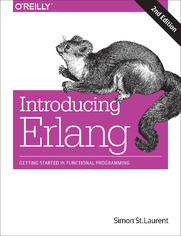Introducing Erlang. Getting Started in Functional Programming. 2nd Edition - Helion

ISBN: 978-14-919-7332-5
stron: 212, Format: ebook
Data wydania: 2017-03-06
Ksi─Ögarnia: Helion
Cena ksi─ů┼╝ki: 126,65 z┼é (poprzednio: 147,27 z┼é)
Oszczędzasz: 14% (-20,62 zł)
If you’re new to Erlang, its functional style can seem difficult, but with help from this hands-on introduction, you’ll scale the learning curve and discover how enjoyable, powerful, and fun this language can be.
In this updated second edition, author Simon St.Laurent shows you how to write simple Erlang programs by teaching you one skill at a time. You’ll learn about pattern matching, recursion, message passing, process-oriented programming, and establishing pathways for data rather than telling it where to go. By the end of your journey, you’ll understand why Erlang is ideal for concurrency and resilience.
- Get cozy with Erlang’s shell, its command line interface
- Define functions, using the fun tool, to represent repeated calculations
- Discover atoms, pattern matching, and guards: the foundations of your program structure
- Delve into the heart of Erlang processing with recursion, strings, lists, and higher-order functions
- Create processes, send messages among them, and apply pattern matching to incoming messages
- Store and manipulate structured data with Erlang Term Storage and the Mnesia database
- Learn about Open Telecom Platform, Erlang’s open source libraries and tools
Osoby które kupowały "Introducing Erlang. Getting Started in Functional Programming. 2nd Edition", wybierały także:
- The Ansible Workshop. Hands-On Learning For Rapid Mastery 665,00 zł, (39,90 zł -94%)
- Cisco CCNA 200-301. Kurs video. Administrowanie bezpiecze┼ästwem sieci. Cz─Ö┼Ť─ç 3 665,00 z┼é, (39,90 z┼é -94%)
- Cisco CCNA 200-301. Kurs video. Administrowanie urz─ůdzeniami Cisco. Cz─Ö┼Ť─ç 2 665,00 z┼é, (39,90 z┼é -94%)
- Cisco CCNA 200-301. Kurs video. Podstawy sieci komputerowych i konfiguracji. Cz─Ö┼Ť─ç 1 665,00 z┼é, (39,90 z┼é -94%)
- Jak zhakowa 125,00 zł, (10,00 zł -92%)
Spis tre┼Ťci
Introducing Erlang. Getting Started in Functional Programming. 2nd Edition eBook -- spis tre┼Ťci
- Preface
- Who This Book Is For
- Who This Book Is Not For
- What This Book Will Do For You
- How This Book Works
- Etudes for Erlang
- Why I Wrote This Book
- Other Resources
- Are You Sure You Want Erlang?
- Erlang Will Change You
- Conventions Used in This Book
- A Note on Erlang Syntax
- Using Code Examples
- Help This Book Grow
- Please Use It For Good
- OReilly Safari
- How to Contact Us
- Acknowledgments
- 1. Getting Comfortable
- Installation
- Firing It Up
- First Steps: The Shell
- Moving through Text
- Moving through History
- Moving through Files
- Doing Something
- Calling Functions
- Numbers in Erlang
- Working with Variables in the Shell
- Seeing Your Bound Variables
- Clearing Bound Variables in the Shell
- 2. Functions and Modules
- Fun with fun
- Defining Modules
- From Module to fun
- Functions and Variable Scope
- Module Directives
- Documenting Code
- Documenting Modules
- Documenting Functions
- Documenting Your Application
- 3. Atoms, Tuples, and Pattern Matching
- Atoms
- Pattern Matching with Atoms
- Atomic Booleans
- Guards
- Underscoring That You Dont Care
- Adding Structure: Tuples
- Pattern Matching with Tuples
- Processing Tuples
- 4. Logic and Recursion
- Logic Inside of Functions
- Evaluating Cases
- If This, Then That
- Variable Assignment in case and if Constructs
- The Gentlest Side Effect: io:format
- Simple Recursion
- Counting Down
- Counting Up
- Recursing with Return Values
- Logic Inside of Functions
- 5. Communicating with Humans
- Strings
- Asking Users for Information
- Gathering Terms
- Gathering Characters
- Reading Lines of Text
- 6. Lists
- List Basics
- Splitting Lists into Heads and Tails
- Processing List Content
- Creating Lists with Heads and Tails
- Mixing Lists and Tuples
- Building a List of Lists
- 7. Higher-Order Functions and List Comprehensions
- Simple Higher-Order Functions
- Creating New Lists with Higher-Order Functions
- Reporting on a List
- Running List Values Through a Function
- Filtering List Values
- Beyond List Comprehensions
- Testing Lists
- Splitting Lists
- Folding Lists
- 8. Playing with Processes
- The Shell Is a Process
- Spawning Processes from Modules
- Lightweight Processes
- Registering a Process
- When Processes Break
- Processes Talking Amongst Themselves
- Watching Your Processes
- Breaking Things and Linking Processes
- 9. Exceptions, Errors, and Debugging
- Flavors of Errors
- Catching Runtime Errors as They Happen
- Raising Exceptions with throw
- Logging Progress and Failure
- Debugging through a GUI
- Tracing Messages
- Watching Function Calls
- 10. Storing Structured Data
- Mapping Your Data
- From Tuples to Records
- Setting Up Records
- Creating and Reading Records
- Using Records in Functions and Modules
- Storing Records in Erlang Term Storage
- Creating and Populating a Table
- Simple Queries
- A Key Feature: Overwriting Values
- ETS Tables and Processes
- Next Steps
- Storing Records in Mnesia
- Starting up Mnesia
- Creating Tables
- Reading Data
- Query List Comprehensions
- 11. Getting Started with OTP
- The Origins of OTP
- Creating Services with gen_server
- A Simple Supervisor
- Packaging an Application
- 12. Next Steps Through Erlang
- Moving Beyond the Erlang Shell
- Distributed Computing
- Processing Binary Data
- Input and Output
- Testing, Analyzing, and Refactoring
- Networking and the Web
- Data Storage
- Extending Erlang
- Languages Built on Erlang
- Community
- Sharing the Gospel of Erlang
- A. An Erlang Parts Catalog
- Shell Commands
- Reserved Words
- Operators
- Guard Components
- Common Functions
- Strings and Formatting
- Data Types for Documentation and Analysis
- B. OTP Templates
- Index





